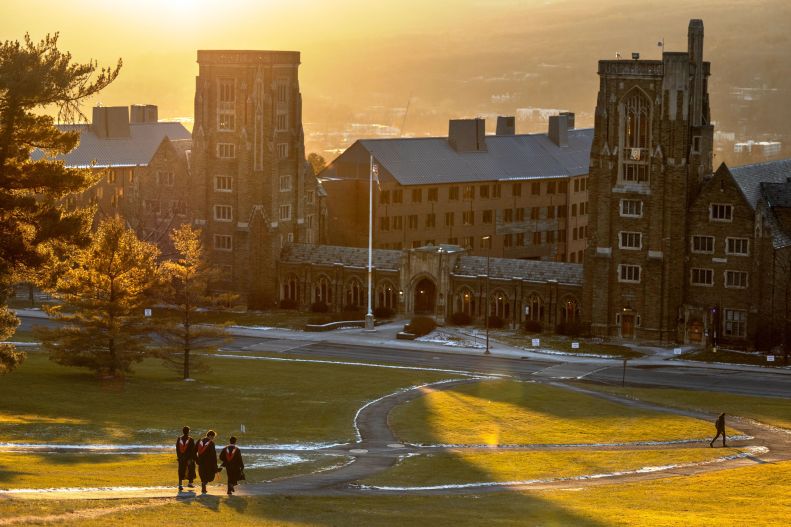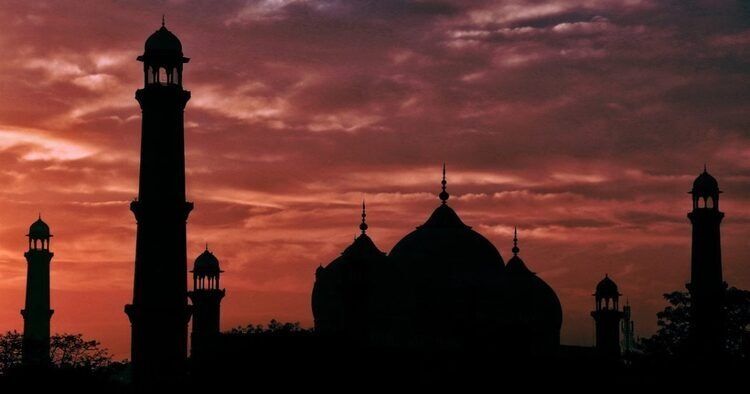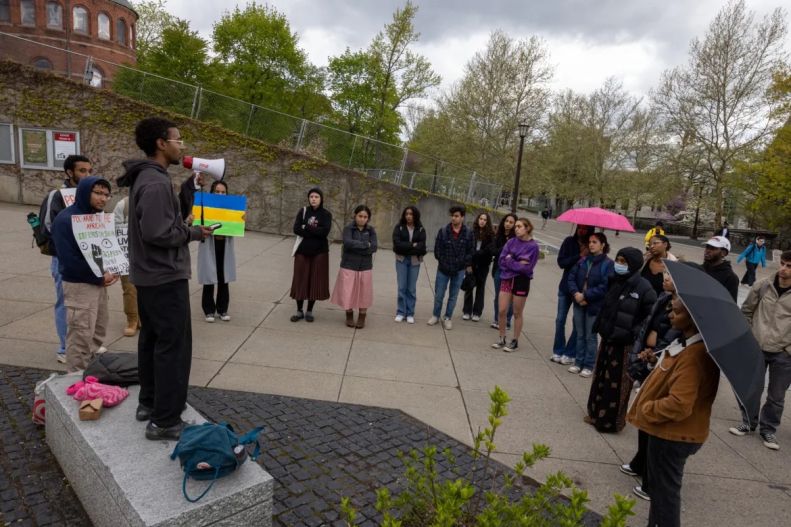Critical Ottoman and Post-Ottoman Studies
Abdel Moneim Mustafa (1930–)

Esra Akcan, IES
"One of the most locally admired Sudanese architects of his generation, Moneim Mustafa lived during the transition from colonial regime to national republic, when professional networks reached not only British colonial architects but also those of the last Ottoman generation." - Esra Akcan, professor of Architectural Theory writes.
Additional Information
Speaker Series to Examine Antisemitism, Islamophobia

Einaudi/CO+POS cosponsor a semester-long series of community talks.
Leading academics from around the country will join Cornell experts in a semester-long series of talks examining antisemitism, Islamophobia, and racism.
Additional Information
Topic
- Critical Ottoman and Post-Ottoman Studies
Program
Speaking across the Ocean: Vakkom Mohammed Maulavi and the Idea of a Public Sphere

March 11, 2024
12:15 pm
Uris Hall, G08
Talk by Dilip Menon (Department of International Relations, Director, Centre for Indian Studies in Africa, University of Witwatersrand)
This is a preliminary paper on the remarkable figure of Vakkom Mohd. Maulavi (1873-1932) of Travancore, on the south-western coast of India, through his writings in the journal Deepika, that he edited. The articles spoke to the reforms of Islamic modernism that were ongoing in Egypt (reported in the widely circulated Al Manar), and imagined a space of Indian Ocean Islam. Vakkom Maulavi was also concerned with the question of people’s rights under the rule of the autocratic Maharaja of Travancore. As publisher of the newspaper Svadeshabhimani edited by the redoubtable and intemperate journalist Ramakrishna Pillai, the duo waged a war of words on the questions of ethical governance and popular representation. There has been a tendency in South Asia to study the history of Muslims separately from their conjoined lives with Hindus and those of other religions. This paper thus speaks to the emerging literature on Indian Ocean Islam (Nile Green, Wilson Chacko Jacob, Seema Alavi, Mahmood Kooria et al) while at the same time arguing for the role of Muslim intellectuals in defining a democratic and secular public sphere.
Dilip M. Menon is the Mellon Chair of Indian Studies and the Director of the Centre for Indian Studies in Africa at the University of Witwatersrand, South Africa. He was educated at the Universities of Delhi, Oxford and Cambridge and earned his PhD from Cambridge. His research for the past decade has engaged with issues of caste, socialism and equality in modern India. He is the author of Caste, nationalism and communism in south India: Malabar, 1900-1948 (Cambridge 1994), The blindness of insight: Essays on caste in modern India (Navayana 2006), The cultural history of Modern India (editor, Social Sciences Press and Berghahn 2006), Capitalisms: Towards a Global History (co-editor, Oxford, 2020), and the translator of Potheri Kunhambu's 1893 Malayalam novel Saraswativijayam (Book Review Literary Trust 2002)
Cosponsored with the South Asia Program
Additional Information
Program
Einaudi Center for International Studies
Comparative Muslim Societies Program
South Asia Program
CO+POS Director Honored with MESA Book Prize

Mostafa Minawi has received the Middle East Studies Association's Albert Hourani Book Award for "Losing Istanbul: Arab-Ottoman Imperialists and the End of Empire."
Additional Information
Topic
- Critical Ottoman and Post-Ottoman Studies
- World in Focus
Program
Imperialism and Ethnology: The Ottoman Paradox

November 29, 2023
4:30 pm
Uris Hall, G08
Talk by Giancarlo Casale
Historians have long asserted the close connection between ethnology—the practice of systematically describing cultural differences—and the politics of imperial domination. But in this respect, the Ottoman Empire presents an apparent paradox. Despite expanding across a territory that encompassed all or part of nearly 40 modern nation-states, early Ottoman authors almost never attempted to describe the cultural diversity of the empire’s subject peoples. Instead, they began to do so at the end of the seventeenth century—long before the onset of Western modernity, but long after the end of Ottoman imperial expansion. How can this apparent paradox be explained? And what lessons might it hold not only for Ottoman history but for a more general understanding of the relationship between knowledge and empire in the early modern world?
Giancarlo Casale is a historian of the Ottoman Empire and its many connections with the early modern world. My current research explores intersections between the intellectual life of the Ottoman Empire and Renaissance Italy, with a particular interest in antiquarianism, cartography, cosmography, and other forms of early modern science. Casale also has a deep interest in the history of travel literature and ethnographic writing, early modern diplomacy, and the history of maritime technology, as well as the comparative study of early modern empires and early modern slavery. In addition to teaching and research, Casale is currently on the editorial boards of several scientific journals, including Renaissance Quarterly, Medieval Encounters, and Arabic Humanities. Casale is also a co-editor of the Brill monograph series Translating Cultures in the Early Modern World and, since 2011, he served as executive editor of the Journal of Early Modern History. Casale is currently on leave from the University of Minnesota through September 2023, as the research chair in Early Modern Mediterranean history at the European University Institute in Florence, Italy.
Additional Information
Program
Comparative Muslim Societies Program
Einaudi Center for International Studies
Institute for European Studies
The Intersectionality of Antisemitism, Islamophobia and Racism

November 16, 2023
4:00 pm
Alice Statler Auditorium
“The Intersectionality of Antisemitism, Islamophobia and Racism,” a talk by Ross Brann, the Milton R. Konvitz Professor of Judeo-Islamic Studies & Stephen H. Weiss Presidential Fellow, will begin at 4 p.m. Nov. 16 in the Alice Statler Auditorium in Statler Hall. Cornell President Martha E. Pollack will offer an introduction at the event and it will be livestreamed as a webinar on eCornell.
During the event, Brann will review the intersection of these three forms of hate in history. His talk will be followed by a question and answer period, with questions from the in-person audience.
Register to watch the livestream here.
Additional Information
Program
Comparative Muslim Societies Program
No End in Sight? Prospects for Peace and Justice in Israel-Palestine

October 31, 2023
12:00 pm
The dramatic escalation of violence in Israel and Palestine should prompt not only horror, grief, and dismay, but also reflection and action toward lasting peace and justice.
This virtual panel will provide expert perspectives on past and future prospects for peace and justice in Israel and Palestine. The event will include a moderated discussion with members of the audience.
The goal of this conversation is to deepen understanding by creating a space for dialogue between scholarly experts and individuals with a variety of perspectives and experiences. Our conversation will center humanity and the possibility of future repair, and encourage good faith participation, while also recognizing the trauma and grief that so many in our community are experiencing. Our ability to speak and learn is accompanied by a responsibility to listen and respect human life. We will stand firmly against any attempt to intimidate, threaten, or harass any member of our community, as we continue to seek possibilities for peace and restorative justice.
Panelists
Uriel Abulof, Associate Professor, Politics, Tel Aviv University Leena Dallashesh, Independent ScholarIan Lustick, Professor Emeritus, Bess W. Heyman Chair in Political Science, University of PennsylvaniaModerator
Rebecca Slayton, Judith Reppy Institute for Peace and Conflict Studies Director and Associate Professor, Department of Science & Technology, Cornell University
Register to join this virtual event
Event Host
Judith Reppy Institute for Peace and Conflict Studies, part of the Mario Einaudi Center for International Studies
Cosponsors
Mario Einaudi Center for International Studies
Department of Near Eastern Studies
Additional Information
Program
Einaudi Center for International Studies
Reppy Institute for Peace and Conflict Studies
Comparative Muslim Societies Program
Moroccan Francophone Literature, Sexualities and Islam

November 2, 2023
4:30 pm
Uris Hall, G08
Talk by Taieb Berrada
This talk will deal with the way Moroccan literature written in French creates a political space challenging the patriarchal establishment by reinterpreting foundational myths in Islam. We will discuss two political and symbolic forces at work in this type of literature: expressing one’s self in the language of the French colonial Other and narrating marginal sexual relationships in Morocco under the harsh dictatorship of Hassan II. It is the interplay of these two aspects that leads to the creation of a new narrative about sexual identities. By doing so, it reveals the instability of a model of identification subjected to a normalizing sexual apparatus controlling bodies and minds in a society where for example homosexual acts are still punishable by law. I will argue that writings by authors such as Abdellah Taïa, Nedjma and others create revised sexual identities, which become emancipated from the Western Oedipal complex while at the same time looking for alternative interpretations of Islamic traditions. Hence, those sexual identities call for a reevaluation of the normativity imposed by the king who is using his power based on a patriarchal interpretation of religious legitimacy in view of political gain.
Additional Information
Program
Einaudi Center for International Studies
Comparative Muslim Societies Program
N. K. Jemisin: Building Our World Better

October 4, 2023
5:30 pm
Cornell University, Rhodes Rawlings Auditorium, Klarman Hall
Bartels World Affairs Lecture
Fantasy author N. K. Jemisin discusses how she learned to build unreal worlds by studying our own—and how we might in turn imagine a better future for our world, and reshape it to fit that dream.
Jemisin's lecture kicks off The Future—a new Global Grand Challenge at Cornell. We invite thinkers across campus to use their imaginations to reach beyond the immediate, the tangible, the well-known constraints. How can we use our creativity to plan and build for a future that is equitable, sustainable, and good? Learn more on October 4.
After her talk, Jemisin joins a panel of distinguished Cornell faculty to explore how we can take a brave leap into the visionary future. What can we collectively achieve when we focus on "what we want," rather than "what I can do"? And when we've imagined a better future for our world, how do we chart the path—starting today—with practical steps to take us there?
Anindita Banerjee, Associate Professor of Comparative Literature, College of Arts and SciencesJohn Albertson, Professor of Civil and Environmental Engineering, College of EngineeringKaushik Basu, Carl Marks Professor of International Studies, Professor of Economics, A&S***
A reception with refreshments will follow the lecture and panel.
Lecture: 5:30 | Rhodes Rawlings Auditorium, Klarman HallThe Future panel, featuring Jemisin and Cornell faculty: 6:15Reception and book signing: 7:00-8:00 | Groos Family AtriumReserve your free ticket for the in-person watch party.
General admission seating is now sold out. By registering for a watch party ticket, you will have an in-person seat reserved in an adjacent classroom near the auditorium where the lecture will be livestreamed. Please follow signage upon your arrival. All watch party attendees are invited to join the post-lecture reception and book signing at 7:00 in Groos Family Atrium, Klarman Hall.
Livestream: For Local, National, and International Viewers
The lecture and panel will be livestreamed. Register to attend virtually at eCornell.
***
How are N. K. Jemisin’s novels acts of political resistance? Read a Bartels explainer by Anindita Banerjee.
***
Book Signing
Ithaca’s cooperatively owned independent bookstore, Buffalo Street Books, will be selling a wide selection of N. K. Jemisin’s books after the lecture.
Meet N. K. Jemisin and get your book signed at the reception!
***
About N. K. Jemisin
N. K. Jemisin is the first author in the science fiction and fantasy genre’s history to win three consecutive Best Novel Hugo Awards, for her Broken Earth trilogy. Her work has also won the Nebula and Locus Awards. She was a 2020 MacArthur Fellow. Jemisin’s most frequent themes include resistance to oppression, the inseverability of the liminal, and the coolness of Stuff Blowing Up. She has been an advocate for the long tradition of science fiction and fantasy as political resistance and previously championed the genre as a New York Times book reviewer. She lives and works in New York City.
***
About Global Grand Challenges at Cornell
Global Grand Challenges bring together Cornell's world-class strengths—vision, expertise, people, and resources—in a multiyear focus to understand humanity's most urgent challenges and create real-world solutions. Global Cornell organizes and supports related research collaborations, courses and academic programs, student experiences, campus events, and more. Cornell's first Global Grand Challenge is Migrations, launched in 2019.
***
About the Bartels World Affairs Lecture
The Bartels World Affairs Lecture is a signature event of the Mario Einaudi Center for International Studies. This flagship event brings distinguished international figures to campus each academic year to speak on global topics and meet with Cornell faculty and students, particularly undergraduates. The lecture and related events are made possible by the generosity of Henry E. Bartels ’48 and Nancy Horton Bartels ’48.
Additional Information
Program
Einaudi Center for International Studies
Reppy Institute for Peace and Conflict Studies
Comparative Muslim Societies Program
East Asia Program
Southeast Asia Program
Latin American and Caribbean Studies
Institute for African Development
Institute for European Studies
South Asia Program
Faculty Keep Their Eyes on Sudan

Mostafa Minawi, CO+POS
Cornell Daily Sun coverage: Following the developments in Sudan, the Critical Ottoman and Post-Ottoman Studies initiative of the Mario Einaudi Center for International Studies held a webinar on May 4 entitled Sudan: Insight into Current Events.
Additional Information
Topic
- Democratic Threats and Resilience
- Critical Ottoman and Post-Ottoman Studies
